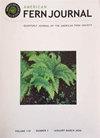北美洲落基山脉的一个新的月草属植物——毛柄肉苁蓉(Opioglossaceae)
IF 0.9
4区 生物学
Q4 PLANT SCIENCES
引用次数: 1
摘要
摘要Botrychium furculatum S.J.Popovich&Farrar是一个新物种,分布在从阿尔伯塔省和蒙大拿州以南到新墨西哥州的落基山脉中部和南部,在萨斯喀彻温省的柏树山、怀俄明州和南达科他州的黑山也有额外的种群。根据等位酶带带型,推测它是一个异四倍体,以苍白球孢B.W.H.Wagner为亲本,另一个尚未描述的二倍体物种(“farrarii”)为另一个亲本。从遗传学上讲,镰状芽孢杆菌与苍白球杆菌的区别在于,它表现出固定的杂合基因座,其中一个基因组贡献的表达等位基因与苍白白球杆菌相匹配,而其他基因组贡献的许多等位基因在苍白球菌中未被检测到,但由“farrarii”表现出来,一系列的叶特征将卷曲B.furculatum和苍白B.pallidum区分开来,特别是孢子体和营养体之间更明显的弓形或叉骨状连接。这两个物种在形态和颜色上的差异导致了对落基山脉苍白球菌的错误报道。本文提出了一个区别于类似种的关键。本文章由计算机程序翻译,如有差异,请以英文原文为准。
Botrychium furculatum (Ophioglossaceae), a New Moonwort Species from the Rocky Mountains of North America
Abstract. Botrychium furculatum S. J. Popovich & Farrar is a new species widespread in the central and southern Rocky Mountains from Alberta and Montana south to New Mexico, with additional populations in the Cypress Hills of Saskatchewan and the Black Hills of Wyoming and South Dakota. Based on allozyme banding patterns, it is inferred to be an allotetraploid with B. pallidum W. H. Wagner as one parent and another, as yet undescribed, diploid species (B. “farrarii”) as the other parent. Genetically, B. furculatum is distinguished from B. pallidum by exhibiting fixed heterozygous loci in which expressed alleles of one of the genomic contributions matches those of B. pallidum, whereas many alleles of the other genomic contribution have not been detected in B. pallidum, but are displayed by B. “farrarii.” Morphologically, a suite of leaf characters differentiates B. furculatum from B. pallidum, particularly a more pronounced bowed or wishbone-like junction of sporophore and trophophore. Gradations in morphology and color between the two species have led to erroneous reports of B. pallidum in the Rocky Mountains. A key to differentiate B. furculatum from similar species is presented.
求助全文
通过发布文献求助,成功后即可免费获取论文全文。
去求助
来源期刊

American Fern Journal
生物-植物科学
CiteScore
1.20
自引率
0.00%
发文量
28
审稿时长
6 months
期刊介绍:
The American Fern Journal is a peer-reviewed journal focused on the biology of ferns and lycophytes.
 求助内容:
求助内容: 应助结果提醒方式:
应助结果提醒方式:


